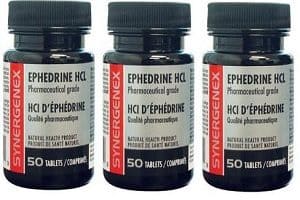
Ephedrine Role In Bechler’s Death. The medical examiner who performed Steve Bechler’s autopsy revealed some new evidence yesterday that reinforces why he is so confident ephedrine played a role in Bechler’s death. Dr. Joshua Perper, Broward County’s chief medical examiner, said medical reports provided by the Orioles show Bechler’s ephedrine use dated about two years. […]

Ephedrine Role In Bechler’s Death. The medical examiner who performed Steve Bechler’s autopsy revealed some new evidence yesterday that reinforces why he is so confident ephedrine played a role in Bechler’s death.
Dr. Joshua Perper, Broward County’s chief medical examiner, said medical reports provided by the Orioles show Bechler’s ephedrine use dated about two years.
Perper also said that a blood sample drawn soon after Bechler reached the hospital will give toxicologists a better chance of finding traces of ephedrine in Bechler’s system than any blood taken after a long, laborious struggle in the intensive care unit.
Those two facts, combined with information Perper gathered through interviews with Bechler’s wife and one of Bechler’s teammates, have emboldened Perper to link the death to ephedrine, even with toxicology results not expected for two weeks.
Bechler, a 23-year-old pitching prospect, collapsed on an Orioles practice field Feb. 16 and died of heatstroke the following morning. In his preliminary autopsy report, Perper said several factors contributed to Bechler’s death, including a history of borderline high blood pressure, liver abnormalities, the fact he had been on a diet, and evidence he used Xenadrine RFA-1, an over-the-counter dietary supplement that contains the stimulant ephedrine.
“Usually we don’t come out with preliminary reports , but in this particular case, I believe we had enough information,” Perper said during a interview at his office.
“The investigation seemed reliable. As I said, I’ll be very, very surprised if it is not going to be ephedra.”
Bechler’s wife, Kiley, plans to sue Cytodyne Technologies, the company that makes Xenadrine RFA-1, according to her attorney, David J. Meiselman. So far, she does not plan to sue the Orioles, Meiselman said.
Yesterday, Perper said he “can’t see where were delinquent in providing care. In other words, they responded to the conditions fast, and they did the best they could.”
Perper did, however, raise the point that Bechler’s ephedrine use was learned two years ago when he saw a doctor about his liver condition. Perper said he received the medical records from the Orioles.
“The medical documentation indicates that it was known that he took about two years ago,” Perper said. “Somebody knew because he told them.”
Asked who Bechler told, Perper said, “The doctor who examined him for his liver problem. … I think it was a specialist. He told one of the doctors that he took it.”
Orioles team physician Dr. William Goldiner said federal guidelines restrict him from giving specific information about Bechler’s medical history, so it remains unclear who knew what and when about Bechler’s ephedrine use within the team’s medical staff.
Bechler passed a routine physical exam two days before he collapsed. Goldiner did not perform that exam, but he said Bechler was probably asked about it that morning.
“Personally,” Goldiner said, “I, myself, and the examining physician did not know of his use of ephedrine. We had no absolute knowledge of that.
“I certainly know baseball players take it, and he might have been one of those I would have suspected. It would have been a standard question in our exams, but we’re not foolish enough to believe there aren’t things players won’t tell us.”
Reached at home in Oregon, Bechler’s father confirmed his son went in to have his liver examined two seasons ago.
“He didn’t tell us about ,” Ernie Bechler said.
Perper has other evidence. Orioles pitcher Matt Riley went to Perper’s office and correctly identified a bottle of Xenadrine RFA-1 that he had seen in Bechler’s locker. Riley said he threw that exact same bottle in the trash while paramedics worked on Bechler in the training room.
Perper also interviewed Bechler’s wife, Kiley, and several sources close to the investigation say she has been very open about her husband’s ephedrine use.
Still, Orioles officials have been bracing themselves for the toxicology reports to come back with no trace of ephedrine. When Minnesota Vikings lineman Korey Stringer died from a heatstroke in 2001, the team later revealed an unopened bottle of Xenadrine was in his locker, but the toxicology results showed no sign of ephedrine in his system.
“If the blood would have been a day later, they probably would have been able to find nothing,” Perper said. “This time, we are lucky because we have initial blood, which was soon after the collapse, or an hour after the collapse.”
The personal injury attorneys at Parker Waichman LLP offer free, no-obligation case evaluations. For more information, fill out our online contact form or call 1-800-YOURLAWYER (1-800-968-7529).


